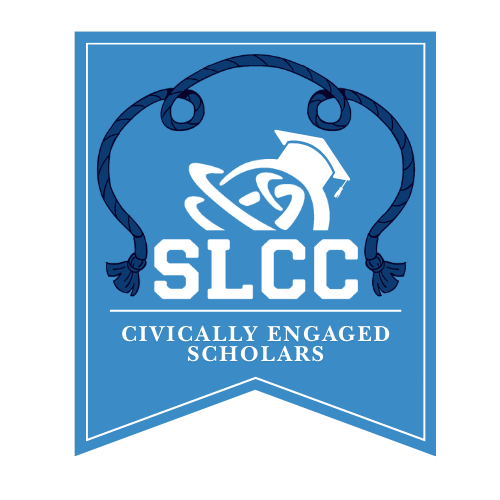Civically Engaged Scholars (CES)
What is CES?

The Civically Engaged Scholars (CES) program encourages students to connect with people in their community, get involved, and think critically about important issues. CES participants learn about the importance of community involvement in the classroom and have the opportunity to apply that knowledge through hands-on experiences with our local community partners.
CES is a degree distinction-seeking program, meaning that upon graduation, you will receive a Special Distinction on your transcript, as well as a blue Honors cord and front-row placement during commencement.
Purpose and Vision
The purpose of CES is to help students grow and think critically while getting involved in their communities. By building strong relationships between local groups and SLCC students, we hope to help foster a community that believes in equity and justice and uplifts us all.
Our vision is to prepare and encourage students to be active in their communities, engaging in local systems and working with local organizations. It’s our hope that providing the knowledge and skills needed to make a difference will uplift both our students and our communities.
Benefits
- Build your network for academic and career advancement
- Special Distinction on transcript
- Designation at Graduation with blue honors cord
- Front row placement during commencement
- Graduation letter from the President
- e-Portfolio with civic engagement material
Program Requirements
Complete a non-credit Canvas course (added manually) OR attend 2 of the 3 conferences listed below:
- Generation Volunteer Summit
- Civic Leadership Conference
- National Youth Leadership Council
- Campus Compact Annual Conference
- The Utah Conference on Community Engagement
- Other (must receive approval from the Engaged Learning Office)
Complete at least two CEL designated classes at SLCC with a final grade of C- or above. Designated classes can be found on the registration website with the attribute ‘Community-Engaged Learning.’ A full list of all CEL classes can be found below:
Community-engagement hours can be completed by participating in/volunteering with an established organization that serves the community.
Examples of experiences that count:
- Taking an additional CEL designated class (one CEL class counts as 100 hours).
- Community-Engagement with Thayne Center Partners or other community partners.
- Club participation with service.
- Semester meeting with Office Specialist.
Note: You are allowed to be paid for up to 50 hours of community-engagement, but the remaining must be unpaid volunteer hours in order to count.
Dental Hygiene and Occupational Therapy Assisting students have these requirements/service hours met through their curriculum and program.
Meet with your assigned Engaged Learning Specialist Peer Leader once a semester.
Create an ePortfolio dedicated to your CEL classes and reflection(s) on any community-engagement you participate in. Please keep track of how many community-engagement hours you complete on your ePortfolio. You can use this template as a guide.
Graduate with a 3.0 Grade Point Average (GPA).
Attend the Engaged Learning Celebration upon graduation.
Events & Opportunities
Engaged Learning Celebration

The Engaged Learning Celebration will highlight student tuition waiver recipients and Civically Engaged Scholars. Join us as we hear about the accomplishments of Community Engaged Learning students plus additional, inspiring keynote speakers. Enjoy food, coffee, fun, and an exciting program that explores stories of service, reflection, and the power of education. We hope to see you there! Check back with us for updates.
Date: 04/29/2026
Time: 11:30am to 1pm
Come back for more events and opportunities!
Graduated C.E.S EPortfolioPathway Definitions
- Community Engaged Learning and Research: Connecting coursework and academic research to community-identified concerns to enrich knowledge and inform action on social issues.
- Community Organizing and Activism: Involving, educating, and mobilizing individual or collective action to influence or persuade others.
- Direct Service: Working to address the immediate needs of individuals or a community, often involving contact with the people or places being served.
- Philanthropy: Donating or using private funds or charitable contributions from individuals or institutions to contribute to the public good.
- Policy and Governance: Participating in political processes, policymaking, and public governance.
- Social Entrepreneurship and Corporate Social Responsibility: Using ethical business or private sector approaches to create or expand market-oriented responses to social or environmental problems.